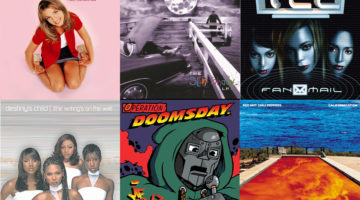
Earl Sweatshirt’s latest album, accurately titled “Some Rap Songs”, released on Friday, Nov. 30. The album is a collection of various sonics, samples and deep lyrics that are telling of his personal experiences with drug addiction, complicated family relationships and his growth as an artist.
The young Thebe Neruda Kgositsile, a.k.a. Earl Sweatshirt, that Odd Future fans first became familiar with in 2010 is no more. With the release of his latest album, “Some Rap Songs”, on Friday, Nov. 30, Earl has made it known that he’s grown substantially both as an artist and individual. The hypnotic, melancholy sounds of each track take listeners on a journey filled with tribulations Earl has overcome and pain he has yet to face.
“Some Rap Songs” plays out as a sample-heavy collection of hard-to-find 1960s and ‘70s soul music, with some electronic, funk and jazz samples sprinkled throughout as well. Not only that, but the album also contains audio excerpts from works of art central to black American culture, like the Blaxploitation film “Black Dynamite” and an educational album about ebonics called “The Dialect of Black Americans”. “Some Rap Songs” is only 25 minutes from start to finish, with 15 songs in total.
Some of Earl’s biggest inspirations in music are plainly evident with the production value and lyricism of this new album as well. One of those inspirations, J Dilla, is perhaps best-known for his 2006 album “Donuts”, which was released three days prior to his death. Dilla worked as a rapper and hip-hop producer, who also relied heavily on samples to inspire his eclectic works of music. “Donuts” is an instrumental hip-hop album that features no original lyrics, with short songs much like Earl’s on “Some Rap Songs”.
Another of Earl’s inspiration, Madvillain, is a hip-hop duo consisting of rapper MF DOOM and producer Madlib. Their debut 2004 album, “Madvillainy”, has been referenced by Earl as an album that influenced his generation the same way Wu-Tang Clan’s “Enter the Wu-Tang (36 Chambers)” album influenced ‘90s rappers. In the album, MF DOOM’s precise lyricism is akin to Earl’s flow in “Some Rap Songs”, and Madlib’s production and sampling are also similar to Earl’s. Fans of Earl Sweatshirt might find it helpful to listen to the two inspirational albums if they’re interested in understanding how Sweatshirt has derived some of the stylings from them.
The opening track on “Some Rap Songs”, “Shattered Dreams”, is sampled from a song of the same name by The Endeavors from 1969. It also features an excerpt from a speech by the well-known author James Baldwin, called “The Artist’s Struggle for Integrity”, given in 1962. In this monologue, Baldwin challenges the relationship between words and their contextual meanings, as well as the integrity of working as an artist. Earl’s inclusion of this monologue in his opening track could be attributed to his struggle to find integrity in his own work as an artist. Alternatively, it might also speak to the carefulness with which Earl chooses his words throughout the album, which Baldwin emphasizes artists must do during his monologue. “Shattered Dreams” also introduces listeners to some of the overarching themes that continue throughout the album, like depression and family. At one point Earl says, “Blast off, buckshot into my ceilin’/Why ain’t nobody tell me I was bleedin’?”, speaking to his suicidal thoughts and spiral into depression which those around him ignored. This track’s sad and slow transitions set the tone for the rest of the album, which essentially follows the same style.
Other tracks, like “Cold Summers”, “Ontheway!”, “The Bends” and “Veins” are also sampled from 1970s soul and funk songs of long-forgotten artists, like Mighty Flames, Soul Superiors, Linda Clifford and Billy Jones. The reverberations and impassioned sounds of these soul artists give the album a more emotional feel that supports Earl’s emotional lyrics, as he describes his struggles with family, addiction and mental illness.
Another song from Earl’s album, “Riot”, samples jazz musician Hugh Masekela’s 1969 song of the same name. Earl Sweatshirt fans might also note that Masekela, a South African artist, was one of Earl’s father’s closest friends. Given that Earl’s father recently passed in January 2018, this song could be seen as an homage to him. Earl also addresses his strained relationship with his father, Keorapetse Kgositsile, in multiple other tracks throughout “Some Rap Songs”, like “Shattered Dreams”, “Red Water”, “The Mint” “December 24”, “Azucar”, “Peanut” and “Playing Possum”, the last of which even features an audio sampling of his father reading one of his poems.
One of the most popular tracks on the album so far is “NOWHERE2GO”, which can be read as “No Where 2 Go” or “Now Where to Go” by listeners. The song incorporates themes of depression, family, drug abuse, religion and friendship. Earl references multiple friends who have helped him throughout his life and drug addiction issues, and says, “I still give thanks to the most high”. Earl, who identifies as a Buddhist, still places a large importance on a “universal being” being present in everything, despite the fact that there is no one god in Buddhism.
Overall, Earl Sweatshirt’s album is a sonic masterpiece that combines personal experience, creative production through sampling and complex lyrics to help tell his story. The album is well deserving of a 4 out of 5.












